Input interpretation

boron oxide
Chemical names and formulas

formula | B_2O_3 name | boron oxide alternate names | boric anhydride | boric oxide | boron trioxide | diboron trioxide | keto-ketoboranyloxy-borane | oxo-oxoboranyloxy-borane | oxo-oxoboranyloxyborane mass fractions | B (boron) 31.1% | O (oxygen) 68.9%
Lewis structure
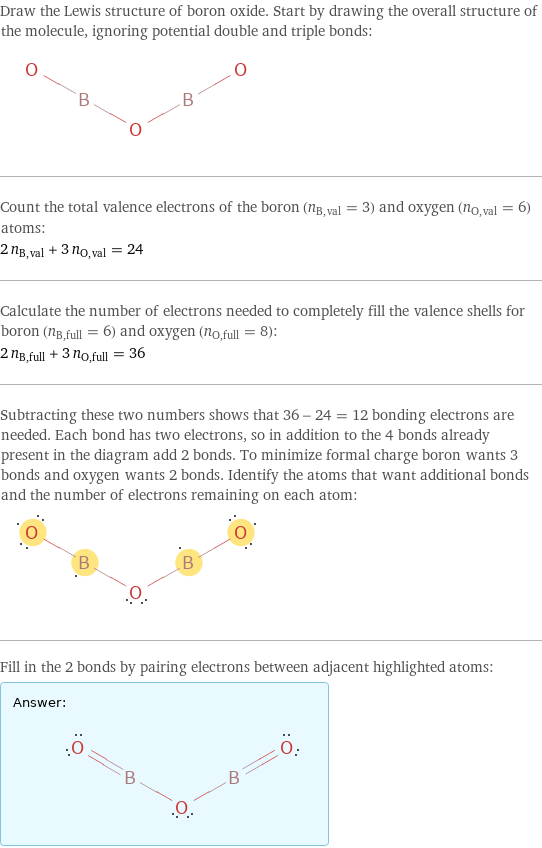
Draw the Lewis structure of boron oxide. Start by drawing the overall structure of the molecule, ignoring potential double and triple bonds: Count the total valence electrons of the boron (n_B, val = 3) and oxygen (n_O, val = 6) atoms: 2 n_B, val + 3 n_O, val = 24 Calculate the number of electrons needed to completely fill the valence shells for boron (n_B, full = 6) and oxygen (n_O, full = 8): 2 n_B, full + 3 n_O, full = 36 Subtracting these two numbers shows that 36 - 24 = 12 bonding electrons are needed. Each bond has two electrons, so in addition to the 4 bonds already present in the diagram add 2 bonds. To minimize formal charge boron wants 3 bonds and oxygen wants 2 bonds. Identify the atoms that want additional bonds and the number of electrons remaining on each atom: Fill in the 2 bonds by pairing electrons between adjacent highlighted atoms: Answer: | |
Basic properties
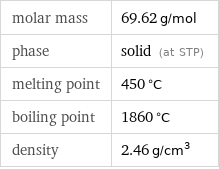
molar mass | 69.62 g/mol phase | solid (at STP) melting point | 450 °C boiling point | 1860 °C density | 2.46 g/cm^3
Units

Solid properties (at STP)

density | 2.46 g/cm^3 vapor pressure | 12 mmHg (at 1400 °C)
Units

Thermodynamic properties
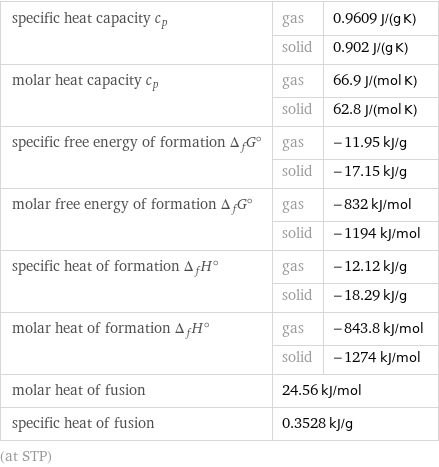
specific heat capacity c_p | gas | 0.9609 J/(g K) | solid | 0.902 J/(g K) molar heat capacity c_p | gas | 66.9 J/(mol K) | solid | 62.8 J/(mol K) specific free energy of formation Δ_fG° | gas | -11.95 kJ/g | solid | -17.15 kJ/g molar free energy of formation Δ_fG° | gas | -832 kJ/mol | solid | -1194 kJ/mol specific heat of formation Δ_fH° | gas | -12.12 kJ/g | solid | -18.29 kJ/g molar heat of formation Δ_fH° | gas | -843.8 kJ/mol | solid | -1274 kJ/mol molar heat of fusion | 24.56 kJ/mol | specific heat of fusion | 0.3528 kJ/g | (at STP)
Chemical identifiers
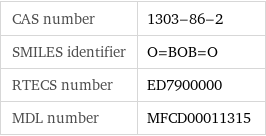
CAS number | 1303-86-2 SMILES identifier | O=BOB=O RTECS number | ED7900000 MDL number | MFCD00011315
NFPA label

NFPA label
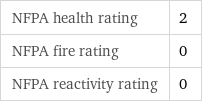
NFPA health rating | 2 NFPA fire rating | 0 NFPA reactivity rating | 0
Toxicity properties

short-term exposure limit | 20 mg/m^3

long-term exposure limit | 10 mg/m^3 (over 8 hours) RTECS classes | primary irritant